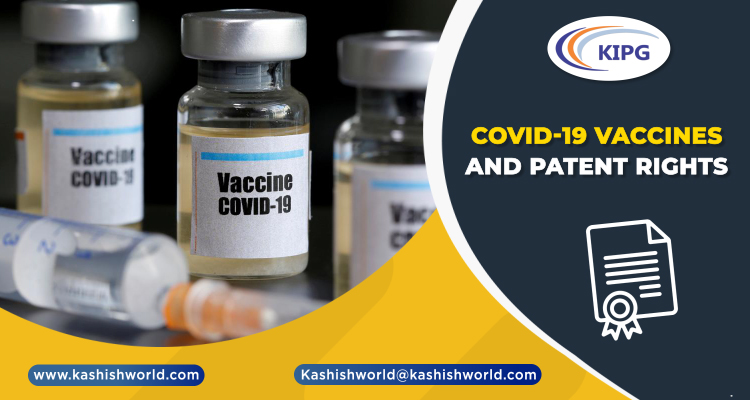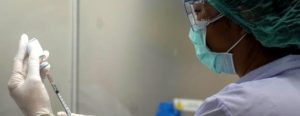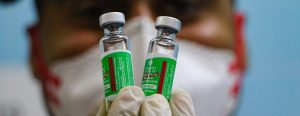
COVID-19 vaccines are set to safeguard billions of citizens worldwide in the coming months. However, vaccinating the entire world population may mean finding a way around Intellectual Property Rights (IPRs). The focus now shifts towards equally challenging issues of availability, accessibility, and affordability of vaccines.

The current pandemic has led to a veritable boom in the research and development of vaccines and treatments, illustrating how the Patent System works to boost innovation. According to the World Health Organization (WHO), there are more than 200 COVID-19 vaccine projects underway across the globe. A quarter of those are in clinical trials, and several have already been approved. In other words, this is a competitive marketplace where companies will fight to manufacture vaccines quickly and keep prices low to earn contracts.
Patent Rights
Patents give the patent holders the exclusive right to stop others from using the patented technology without their license for the duration of the patent (generally 20 years). This right allows the patent holders to develop an income stream and recoup their investment in the technology. Yet patents have significant implications for healthcare. For example, patent holders can refuse licenses to third parties to produce a patented medicine. The same could lead to the patent holder becoming the only provider of that medicine with implications for its supply.
Patents can also impact the price of medicines as the patent holders can charge enormously for licenses or access. The significance of such issues is heightened in the global pandemic context because it is in all our interests to eliminate the virus globally as quickly as possible. This is best achieved by maximizing affordable access to future vaccines and medicines globally. However, to do so, the ethical implications of Patent Rights must be acknowledged, and we must ensure that the way patents are used does not obstruct access.

South Africa and India have called for the World Trade Organization (WTO) to suspend the IPRs related to COVID-19 for ensuring that not only the wealthiest countries but also the least developed ones get access to and can afford the vaccines, medicines, and other new technologies needed to control the pandemic. The pharmaceutical industry and many high-income countries (HICs) staunchly oppose the move, which they say will stifle innovation when needed the most. Without special measures, proponents argue that rich countries will benefit from new technologies as they come to the market, while poor nations will continue being devastated by the pandemic. The proposal states that IPRs such as patents are obstructing affordable COVID-19 medical products. A temporary ban would allow multiple actors to start the production pretty soon instead of having manufacturing concentrated in the hands of a small number of patent holders. The proposal was initially tabled last year in October in the TRIPS Council, a committee dedicated to discussing the implementation of the WTO’s IP agreement, where it rallied support from other low and middle-income countries and attracted the co-sponsorship of Kenya, Eswatini, Mozambique, Bolivia, and Pakistan.

Two crucial issues must be addressed. In the first place, there is a need to clarify and strengthen national compulsory licensing mechanisms. Secondly, countries should support voluntary international patent licensing initiatives to secure favorable access for the patented COVID-19 medicines and vaccines globally.
Compulsory Licensing and Access
Under international trade law, pathways exist for countries to issue compulsory patent licenses, provided certain legal criteria are met. Compulsory licenses allow countries to grant permission to a third party to produce the patented invention, for instance, medicines, without the patent holder’s consent. Compulsory licenses could be used to ease concerns caused by other countries negotiating deals with patent holders for significant supplies of life-saving medicines and vaccines. By using compulsory licenses, a country could grant permission to third parties to make similar (generic) versions of medicines for use in that country if access on reasonable terms cannot be obtained from the patent holder (provided raw materials and manufacturing capabilities were available).

Conventionally, countries have been reluctant to use compulsory licenses given industry opposition. Nevertheless, COVID-19 provides a strong motivation for change. Some nations have adopted legal measures to facilitate compulsory licensing, where required in the pandemic. Other nations should also do the same and ensure that any national or regional barriers to the effective use of compulsory licensing are eliminated.
Voluntary Licensing – Towards a Possible Solution?
Compulsory licensing can address access issues within the countries for individual medicines and vaccines. However, the arrangements where patent holders voluntarily license their patents on reasonable terms to address COVID-19 are also important and must be supported as these can have broader global impacts. For example, WHO recently launched the COVID-19 Technology Access Pool (C-TAP), which encourages the patent holders to voluntarily share or pool IPRs, knowledge, and data to tackle COVID-19. 39 countries worldwide have endorsed this pool, but the US and the UK have opposed it. Other countries should take action to endorse this initiative as soon as possible as a commitment to global solidarity in addressing COVID-19.

To conclude, COVID-19 poses a fundamental challenge to global health. Combined with exceptional work being conducted to develop vaccines and medicines, better consideration is urgently needed over how such vaccines and medicines will be accessed once developed. Also, the power of the patent holders in such contexts cannot be overlooked.

